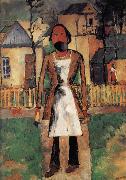Wholesale Oil Painting No Minimum |
|||||||||||
|
|
|||||||||||

|
|||||||||||
|
|
|
||||||||
Kasimir Malevich1878-1935 Kasimir Malevich Gallery In 1904, after the death of his father, he moved to Moscow. He studied at the Moscow School of Painting, Sculpture and Architecture from 1904 to 1910 and in the studio of Fedor Rerberg in Moscow (1904?C1910). In 1911 he participated in the second exhibition of the group Soyuz Molodyozhi (Union of Youth) in St. Petersburg, together with Vladimir Tatlin and, in 1912, the group held its third exhibition, which included works by Aleksandra Ekster, Tatlin and others. In the same year he participated in an exhibition by the collective Donkey's Tail in Moscow. By that time his works were influenced by Natalia Goncharova and Mikhail Larionov, Russian avant-garde painters who were particularly interested in Russian folk art called lubok. In March 1913 a major exhibition of Aristarkh Lentulov's paintings opened in Moscow. The effect of this exhibition was comparable with that of Paul Cezanne in Paris in 1907, as all the main Russian avant-garde artists of the time (including Malevich) immediately absorbed the cubist principles and began using them in their works. Already in the same year the Cubo-Futurist opera Victory Over the Sun with Malevich's stage-set became a great success. In 1914 Malevich exhibited his works in the Salon des Independants in Paris together with Alexander Archipenko, Sonia Delaunay, Aleksandra Ekster and Vadim Meller, among others. It remains one of the great mysteries of 20th century art, how, while leading a comfortable career, during which he just followed all the latest trends in art, in 1915 Malevich suddenly came up with the idea of Suprematism. The fact that Malevich throughout all his life was signing and re-signing his works using earlier dates makes this u-turn in his artistic career even more ambiguous. Be that as it may, in 1915 he published his manifesto From Cubism to Suprematism. In 1915-1916 he worked with other Suprematist artists in a peasant/artisan co-operative in Skoptsi and Verbovka village. In 1916-1917 he participated in exhibitions of the Jack of Diamonds group in Moscow together with Nathan Altman, David Burliuk and A. Ekster, among others. Famous examples of his Suprematist works include Black Square (1915) and White on White (1918). In 1918 Malevich decorated a play Mystery Bouffe by Vladimir Mayakovskiy produced by Vsevolod Meyerhold. Malevich also acknowledged that his fascination with aerial photography and aviation led him to abstractions inspired by or derived from aerial landscapes. Harvard doctoral candidate Julia Bekman Chadaga writes: ??In his later writings, Malevich defined the 'additional element' as the quality of any new visual environment bringing about a change in perception .... In a series of diagrams illustrating the ??environments' that influence various painterly styles, the Suprematist is associated with a series of aerial views rendering the familiar landscape into an abstraction..." (excerpted from Ms. Bekman Chadaga's paper delivered at Columbia University's 2000 symposium, "Art, Technology, and Modernity in Russia and Eastern Europe"). |
||||||||
|
|
||||||||
Squareman
Squareman Painting ID:: 36275 |
mk110
1927
Oil on board
72x54cm
mk110 1927 Oil on board 72x54cm |
|||||||
|
|
||||||||
|
Diego Rivera Mexican Social Realist Muralist, 1886-1957,Mexican muralist. After study in Mexico City and Spain, he settled in Paris from 1909 to 1919. He briefly espoused Cubism but abandoned it c. 1917 for a visual language of simplified forms and bold areas of colour. He returned to Mexico in 1921, seeking to create a new national art on revolutionary themes in the wake of the Mexican Revolution. He painted many public murals, the most ambitious of which is in the National Palace (1929 ?C 57). From 1930 to 1934 he worked in the U.S. His mural for New York's Rockefeller Center aroused a storm of controversy and was ultimately destroyed because it contained the figure of Vladimir Ilich Lenin; he later reproduced it at the Palace of Fine Arts in Mexico City. With Jose Clemente Orozco and David Alfaro Siqueiros, Rivera created a revival of fresco painting that became Mexico's most significant contribution to 20th-century art. His large-scale didactic murals contain scenes of Mexican history, culture, and industry, with Indians, peasants, conquistadores, and factory workers drawn as simplified figures in crowded, shallow spaces. Rivera was twice married to Frida Kahlo. Squareman mk117 1943 Oil on canvas 30x23 |
||||||||
|
|
||||||||
|
Prev Next
|
||||||||
|
|
||||||||
|
Related Paintings to Diego Rivera :. |
||||||||
|
|
||||||||
|
CONTACT US |

